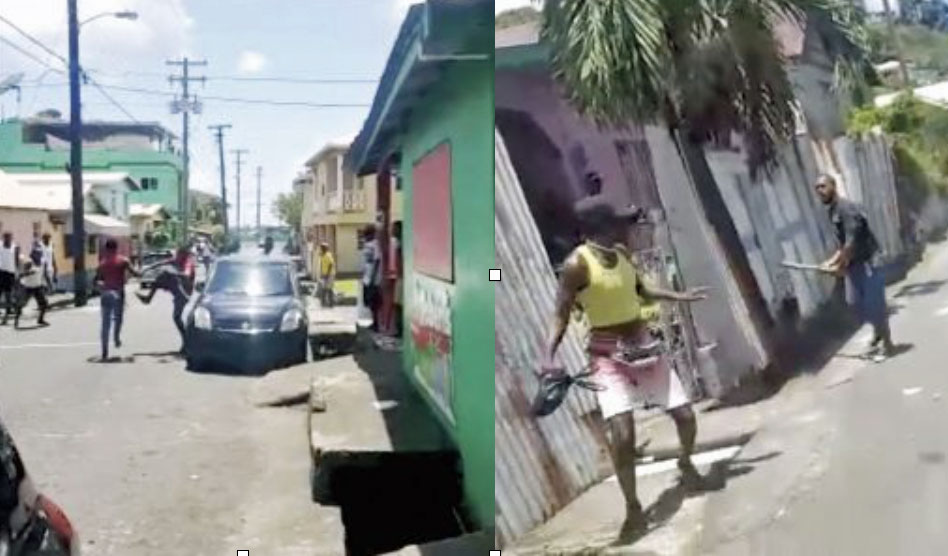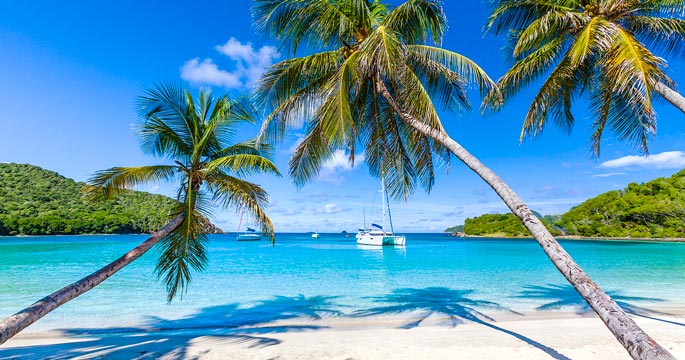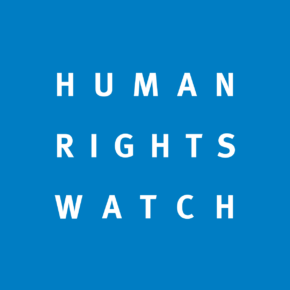Focus on Saint Vincent in the Caribbean: ‘The laws create a system of homophobia’
Colin Stewart is a 45-year journalism veteran living in Southern…
Anti-gay law leads to discrimination, stigma and human rights abuses

I think the laws [criminalizing consensual gay sex] create a system of homophobia. I am hoping that one day the buggery [law] can be lifted, to be free.
— Andrew Williams (pseudonym), a 28-year-old gay man from Saint Vincent, January 11, 2023
People feel they can harass us because of the laws. If people are having an argument, that’s [their] justification for homophobia. They say it’s the laws, that it’s illegal.
— Samuel Sayers (pseudonym), a 25-year-old gay man from Saint Vincent, October 25, 2022

Saint Vincent and the Grenadines is one of six Caribbean nations that criminalize gay sex. A report from Human Rights Watch reveals the discrimination, stigma and human rights abuses that the Saint Vincent law inflicts on its LGBTQ citizens.
“They Can Harass Us Because of the Laws”
Violence and Discrimination against LGBT People in Saint Vincent and the Grenadines
Significant legal changes are afoot in the Caribbean. In 2022, courts in three countries in the region—Antigua and Barbuda, Barbados, and Saint Kitts and Nevis—struck down laws that criminalized consensual same-sex conduct. These three island nations joined neighboring Belize and Trinidad and Tobago, whose courts overturned their own versions of these discriminatory laws in 2016 and 2018, respectively. While some could still be appealed, the rulings represent a watershed moment for sexual and gender minorities in the region.
This progress has been slow and incremental, spearheaded by civil society efforts in the region to abolish laws that criminalize gay sex. These laws reinforce societal prejudices, effectively giving tacit legal sanction for stigma, discrimination, and violence against lesbian, gay, bisexual, and transgender (LGBT) people. They date back to the 19th century when British colonial rulers imposed them on the region; however, post-independence governments have embraced the laws and been loath to repeal them. Today, six of the twelve Anglophone countries in the Caribbean region continue to criminalize consensual same-sex intimacy.

The island country of Saint Vincent and the Grenadines is one of them. Though it gained full independence from the United Kingdom in 1979, its criminal code retains colonial-era laws. Saint Vincent and the Grenadines penalizes “buggery,” or anal sex, with up to ten years’ imprisonment and “gross indecency with another person of the same sex,” with up to five years’ imprisonment. Both crimes are widely understood through legal history and precedent to denote same-sex intimacy. The laws are vaguely worded, have broad latitude, and single out consensual gay sex in the “sexual offenses” section of the criminal code that is otherwise reserved for crimes like rape, incest, and sexual assault.
There have been no recent convictions on the basis of these criminal provisions in Saint Vincent and the Grenadines, but the laws continue to stigmatize LGBT people and contribute to an environment in which violence and discrimination against these populations are commonplace and represent an obstacle to full equality.
In July 2019, two gay men from Saint Vincent and the Grenadines living abroad filed a case challenging the constitutionality of these discriminatory provisions in the criminal code. They claimed that they had to flee their home country due to the draconian and damaging effects of these laws. In November 2019, the High Court permitted ten churches, collectively known as the “Christian Coalition,” to join the litigation as interested parties. The group held a rally that month in opposition to declaring the laws unconstitutional. At the time of writing, the constitutional case was still pending before a national court of first instance.
The continued existence of such laws in the island nations of the Caribbean stands in stark contrast to the much more substantial progress that has been made in the larger Americas region on the rights of and protections for sexual and gender minorities in recent decades. Along with Dominica, Guyana, Grenada, Jamaica, Saint Lucia—the other five countries in the Caribbean that criminalize gay sex—Saint Vincent and the Grenadines continues to be an outlier in a hemisphere that has eschewed the criminalization of consensual gay sex. The country’s parliament should take note of these advances in the region, as well as recent rulings in the Caribbean, uphold international human rights law, and repeal these abusive laws.
Based on interviews with LGBT people and activists between September 2022 and February 2023, documentary evidence, legal analysis, and a range of secondary sources, this report exposes the physical and verbal abuse, sexual violence, and discriminatory treatment that sexual and gender minorities too often experience in Saint Vincent and the Grenadines.
The abuses documented by Human Rights Watch occurred in public spaces, from the street to the beach; at home, work, and school; in police stations—in virtually all areas of life. Perpetrators included passersby on the street, family members, neighbors, coworkers, classmates, teachers, and police officers. Some interviewees attributed the discrimination they experience, and/or their reluctance to seek help and support, to the laws criminalizing same-sex conduct.
Every LGBT person interviewed by Human Rights Watch said they wished to leave the country immediately or had envisioned their future abroad due, in part, to the homophobic or transphobic violence and discrimination in the country.
Nearly all LGBT interviewees reported at least one recent incident of physical or verbal abuse, threats, sexual violence, or harassment. For some, this is part of everyday life. Some interviewees appealed to the police for assistance, but in most instances, the authorities were unhelpful; they were even openly discriminatory toward some interviewees. Some interviewees reported experiencing trauma or other mental health conditions because of these experiences.
Violence occurs not only on the street, but also in the home. Most of the LGBT interviewees said their family members physically and verbally abused them. For many, this domestic violence deprived them of family support, sometimes leading to socioeconomic precarity, including homelessness. Some interviewees noted that family rejection was often couched in moralistic terms, echoing the homophobic rhetoric preached in some churches, which are a cornerstone of social life and shape social attitudes. For nearly all interviewees, domestic violence left big emotional scars.
For LGBT jobseekers, employment discrimination is common. While unemployment is generally high in the country, LGBT people face additional barriers. Many interviewees said they were not hired or they had been fired explicitly because of their sexual orientation. Some lesbian and bisexual women interviewed by Human Rights Watch said they faced sexual harassment in the workplace, which was often related to their sexual orientation, gender, or both. Only a few interviewees said they had a safe work environment, including two who worked for their families; half of these interviewees said they feared ever needing to look for another job given the widespread discrimination in the employment market.
At school, most interviewees experienced stigma and discrimination from teachers and fellow students. Most interviewees also endured physical and verbal bullying, which led some interviewees to leave school at an early age. For some female interviewees, bullying was often accompanied by sexual harassment and violence. In most cases, teachers were not helpful, so interviewees did not feel comfortable asking them for protection. No interviewee received sexuality education that was inclusive of sexual and gender diversity.
These human rights abuses and the continued criminalization of gay sex in Saint Vincent and the Grenadines contravene international human rights law. Under international human rights law, matters of sexual orientation and gender identity, including consensual sexual relations, are protected under the right to freedom from discrimination, the right to privacy, and the right to protection of the law against arbitrary and unlawful interference with, or attacks on, one’s private and family life and honor. Accordingly, international human rights treaty bodies have repeatedly called for the decriminalization of consensual same-sex conduct.
Furthermore, Saint Vincent and the Grenadines has undertaken international human rights law obligations to protect the rights of everyone, including LGBT people, to life and security, freedom from ill-treatment, housing, work, and education. By failing to protect these rights of LGBT people, Saint Vincent and the Grenadines is in violation of its international human rights treaty obligations.
To address these abuses, Saint Vincent and the Grenadines should urgently repeal the buggery and gross indecency provisions in the criminal code that penalize consensual sexual activity among persons of the same sex. The House of Assembly should also pass comprehensive anti-discrimination legislation that prohibits discrimination, including on grounds of gender identity and sexual orientation, and that includes effective measures to identify, prevent, and respond to such discrimination.
The National Prosecution Service and the Ministry of National Security should implement public policies to ensure prompt, thorough, and independent investigations into crimes and discrimination against LGBT people and hold those responsible accountable, including law enforcement officers. Other ministries, including those responsible for labor laws and education, should launch public campaigns to educate employers, educators, and the general public on the rights of LGBT people in their respective sectors.
In less than a decade, five Caribbean countries have decriminalized gay sex, bringing the Western Hemisphere closer to being completely free of these discriminatory laws. The government of Saint Vincent and the Grenadines should join its neighbors in shaking off this painful legacy of colonial rule. Decriminalization may also facilitate the government’s ability to further address homophobic and transphobic discrimination in various sectors, such as work and education. These steps will not only create a more equal society for LGBT people in Saint Vincent and the Grenadines, but it will strengthen the rule of law for everyone living there.
Download the full HRW report on Saint Vincent and the Grenadines here.




